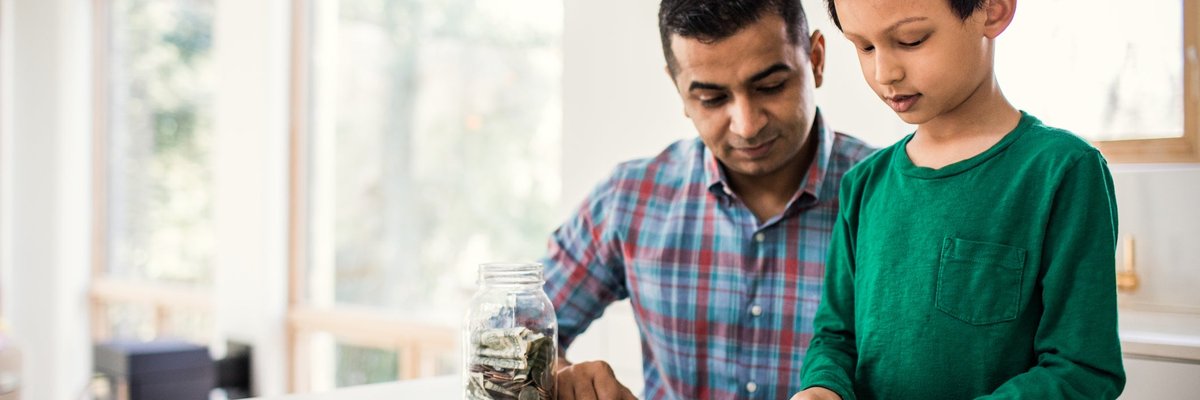5 Reasons Now Is the Right Time for Your Child to Open a Bank Account
KEY POINTS
- A bank account teaches children about delayed gratification.
- An interest-paying account illustrates the power of compound interest.
It's never too early to help your child learn money skills.
I didn't open my first bank account until I was married. Granted, I was quite young but still woefully ignorant about personal finances. I would not wish that on any young adult. While I understand that my parents believed they were protecting me from the harsh realities of life, I should have known -- at the very least -- how bank accounts work.
Until 18, your child needs you to sign up as a custodial or joint account holder, but that doesn't mean you should wait. It's never too early to open a checking account in your child's name. Just as kids learn the rules of video and board games, they can learn the rules of banking. Here are five reasons today is the right time to open an account:
1. You show rather than tell
Let's say you drive through your bank to make a deposit and explain to your child what you're doing. Depending on the age, they may (or may not) understand what you're telling them. However, allowing a child to deposit money into their own bank account makes it far more likely that they'll grow to learn what it means to make a deposit. The same is true of how savings accounts work and the power of compound interest. Once they see it for themselves, it feels real and sticks with them.
2. A bank account introduces a child to saving
I remember the first time I wanted to buy something with my own money and how long it took me to save up for it. There's a pride that comes with earning enough to get what you want. With a bank account, your child can look at their balance and tell how close they are to meeting their goal. And let's face it, learning to save for what they want is a lesson that will benefit them throughout their life.
3. It gives them practice making tough choices
If your child has $100 but wants $200 worth of stuff, they're forced to make a hard choice. And for most of us, life is full of financial decisions. Do we buy a new water heater or go on a weekend trip? Do we buy a new car or put more away in savings each month? Starting early deepens a child's understanding of what it is to make tough financial choices.
4. It can teach them to say no to themselves
As a parent, it's hard to always feel like the bad guy, the person who rains on your child's parade by saying no. However, learning to say no to ourselves is essential. Whether it involves eating a third piece of pie at Thanksgiving or buying another pair of boots we can live without, saying no is not a discipline that comes easy to everyone. If your child is expected to purchase the things they want from the funds in their bank account, they will learn to recognize when the answer is no.
5. It may protect them
According to the National Coalition Against Domestic Violence (NCADV), financial abuse is present in up to 99% of domestic violence situations. When people in domestic violence situations are asked, the number one reason cited for staying with their abuser is a lack of financial resources.
No matter what gender your child identifies as, they should never depend on another person to meet their financial needs. If a couple has a child and decides that one parent will stay home while the other goes to work, that's fabulous -- as long as the person at home has the financial know-how to make it on their own if the need arises. Teaching your child how to manage money is a lesson they will not forget, and if they can manage their own money as they're growing up, they will have more confidence about doing the same as an adult.
What to look for
As you shop for a bank for your child, look for one that is FDIC-protected (or NCUA-protected if it's a credit union). Also, seek a financial institution that caters to kids' accounts. Some offer educational materials geared toward children along with no-fee accounts.
As our kids grow, we do everything we can to keep them safe. We teach them their address and phone number to find their way home if they get lost. We teach them whom they should and should not talk to. Why not teach them about banking, too?
Our Research Expert
We're firm believers in the Golden Rule, which is why editorial opinions are ours alone and have not been previously reviewed, approved, or endorsed by included advertisers. Motley Fool Money does not cover all offers on the market. Motley Fool Money is 100% owned and operated by The Motley Fool. Our knowledgeable team of personal finance editors and analysts are employed by The Motley Fool and held to the same set of publishing standards and editorial integrity while maintaining professional separation from the analysts and editors on other Motley Fool brands. Terms may apply to offers listed on this page. APYs are subject to change at any time without notice.



